- Home
- Madeleine L'engle
The Rock That Is Higher Page 4
The Rock That Is Higher Read online
Page 4
It is a marvelous story, and a potent reminder to us of the love of the Creator, a love so great that it is beyond our imagining.
In the beginning was the Word, says John in his Gospel,
and the Word was with God, and the Word was God….Through him all things were made; without him nothing was made that has been made. In him was life, and that life was the light of men. The light shines in the darkness, but the darkness has not understood it.
Wonderful words about the Word! The three young men sang their words about the Word in the fiery furnace, and they were not alone. And they were at home.
How multileveled stories are! With the story of Daniel and three young men we can dig and dig and never come to the bottom.
Nebuchadnezzar was so impressed that he called the three young men forth, and they came out of the fiery furnace. And all were amazed when they saw that the fire had not harmed their bodies, nor was a hair of their heads singed; their robes were not scorched, and there was no smell of fire on them.
Daniel, too, was hated for his single-minded love of God and for his obedience to God’s laws, and in his turn was cast into a den of lions, but the lions, in their full being, lay down beside Daniel like the animals in Eden when all Creation was still what it was meant to be.
Isaiah foretells the life in the kingdom when he writes, The wolf will live with the lamb, the leopard will lie down with the goat, the calf and the lion and the yearling together; and a little child will lead them.
A little child. Jesus said that unless we have the hearts of children we cannot enter the kingdom of heaven. Children love story and understand that story is truth. Tell me a story, I demanded of my mother, and so my children and grandchildren have demanded of me. Tell me a story, and I still love story. When I go to bed at night I want to relax and read—story. It was an added problem for me in the hospital in San Diego that I was not strong enough to hold the physical weight of a book, not even a paperback, for several weeks. Story makes us more human, and until we become fully human we will not be ready for home.
And the cow and the bear shall feed; their young ones shall lie down together: and the lion shall eat straw like the ox. And the suckling child shall play on the hole of the asp, and the weaned child shall put his hand on the cockatrice’ den.
When my mother was a little girl in north Florida, she and her friends used to play amidst the great jungle of trees and Spanish moss and vines, and she and a little group of girl cousins, unbeknownst to their parents, played for weeks with a nest of tarantulas, those terribly poisonous red and furry spiders. Did their innocence save them? The mother spider allowed them to hold and stroke her babies. Of course, when the grown-ups found out, they were horrified, and the children were forbidden to go near the tarantula nest. But what does this story tell us?
Isaiah continues, They shall not hurt nor destroy in all my holy mountain: for the earth shall be full of the knowledge of the Lord, as the waters cover the sea.
The king did not want to put Daniel into the lions’ den, but he had to, or break his word. He said to Daniel, “May your God, whom you serve continually, rescue you!” but as we read the story it does not sound as though the king put too much stock in his own words. After Daniel was thrust into the den, and the den was sealed, the king fasted all night and did not sleep. Very early in the morning he went to the lions’ den and called to Daniel, “Daniel, servant of the living God, has your God, whom you serve continually, been able to rescue you from the lions?”
And Daniel called out and told the king that God had sent an angel to be with him and that the lions had not hurt him.
A den of lions, Daniel, and an angel. “Fear not, Daniel!” the angel must have cried. And the lions lay down beside Daniel and slept quietly all night.
Daniel, fully Daniel; the angel, fully an angel; the lions fully lions; each one wholly what each was meant to be; all of them living together in peace.
What has happened to us? We have not been wholly what we are meant to be for a long time. When I am in the fiery furnace, I burn. My faith is not the pure faith of Daniel, or of Shadrach, Meshach, and Abednego. Can we ever again become wholly what we are meant to be?
Story helps to show me. Sometimes in the darkest of moments we are fully human. There is a story told of the evil time when Adolf Hitler and his armies tried to enslave Europe and destroy the Jews. A village in Poland was taken, and all the Jewish men were rounded up and put into the synagogue. While the women and children watched, the synagogue was set on fire. From within the burning building came the sound of the men singing the Kaddish, the great Jewish prayer for the dead, singing it for themselves as they died, in total affirmation of the Lord of Creation who cares for us creatures—in life, and beyond.
One of the results of the Fall is that we have forgotten who we are, and so have forgotten how to be. Learning to be hurts. We can sing songs of happiness without knowing pain. But we can sing the joy of our creation and honor our Creator only from within the fire.
We walked through fire and water, David the psalmist cried, and affirmed that even in the fire, even in the deep waters, God is there. And Solomon sings in his great love song, Many waters cannot quench love, rivers cannot wash it away. Nor can the fire destroy it.
That love which cannot be destroyed has been the central core of stories since stories were first told or chanted around the campfires at night. Sometimes that love is shown by what we human creatures do to hurt it. We learn about love by being shown the abuses of love in Anna Karenina, or The Brothers Karamazov, or King Lear. Often when I am tired at night my bedtime reading is a murder mystery. Most of the writers to whom I turn are committed Christians, because it takes a firm grounding in the love of God for a writer to go into the darkest depths of the human heart. Often in these mysteries that love which will make us more human shines through the ugliness of greed and murder. Love does not triumph easily or without pain, but story gives us the courage to endure the pain.
When did King David go home? As I have lived with his story, it seems to me that he learned what home meant only after the deaths of many of his children, the betrayal of his beloved son, Absalom; only after he had been driven out of his holy city, and everything had been taken away; only when he knew himself completely dependent on God’s love.
Wordsworth, in his “Ode on Intimations of Immortality,” writes,
The sunshine is a glorious birth:
But yet I know, where’er I go,
That there hath passed a glory from the earth.
The glory of our home, the home to which we journey throughout the story of our lives.
2
STORY AS A FAMILY AFFAIR
Often I am asked if the fact that I married and had a family has affected my writing.
Of course it has! We write out of our own experience, and my experience is that which springs from being a wife and a mother and from my struggles to be human under these particular circumstances. Certainly I could not have written about the Murrys or the Austins without my own family experience.
And now I write from the point of view of a single woman, a woman whose husband has died. Why do I dislike the word widow? Several other women whose husbands have died agree with me. We are women who no longer have a husband and who must get on with life as well as we can, living, loving, continuing to work, to see friends. I have had the blessing of living, for the first years since Hugh’s death, with my granddaughters through their years of college, and now Charlotte is in graduate school in New York. We entertain together, and this is a great joy, but it is very different from entertaining with a husband. Not better or worse, just different. But I know that sooner or later both these young women will be gone from my nest, and life will be different once again. And my writing will reflect my living.
If I hadn’t married and had children and grandchildren I would still have written, though
undoubtedly I would have written differently, out of different experience.
And my own experience of course goes back to long before I was married, goes back to my solitary childhood. I was an only child, born late in the marriage of my parents. I did not do well in school. I was slightly lame and was not appreciated by either my classmates or my teachers, who thought I was stupid. I went home from the hell of school to my own small room where I wrote, and asked all the big questions—mostly to myself, or to God. My parents were busy, and I didn’t want to bother them. I asked why there was war, why people are cruel, why the wicked flourish and the innocent suffer. I asked what life is about and my own small place in it. Does each one of us really make a difference? Does God really count the hairs of our heads? I knew about that because my parents were Scripture readers, and taught me to love the Bible, that great and wonderful storybook.
As I read Scripture I saw that God used strange people to do the work of Love, ordinary people who were just like the rest of us, not perfect, not morally virtuous, but people who listened to God and, often reluctantly, did what was asked of them.
Women did extraordinary things in Scripture. Deborah was one of the first judges. Esther was not only married to a king, she virtually ruled the country, and with an iron hand. Jael was a heroine, if a bloody one, in rescuing the Israelites from defeat in battle by driving a tent peg through the head of Sisera, their enemy. Certainly their stories helped me to hold high the image of women. And my reading of the biblical stories was the start of a lifelong habit of Scripture reading.
I don’t think I learned anything in school until the last four years, my high school years. We left New York when I was twelve, and I went to a boarding school which was even grimmer than my day school in New York because I could not come home at the end of the day. But I survived it, and we returned to the States in time for me to go to Ashley Hall, in Charleston, South Carolina, for four productive, creative years. Finally I had teachers who believed in me, and I lived in an atmosphere that stimulated and challenged me. Ashley Hall was started by Mary Vardrine McBee, a remarkable Southern gentlewoman who gave us treasures we didn’t even begin to appreciate because we simply took them for granted.
Every December we performed three plays from the Chester Cycle. I was tall, so I always got to play one of the major roles, a shepherd or a king. The girls with the best singing voices were the Red Choir, and the rest of the school dressed as medieval peasants, carrying tapers, and going to church on Christmas Eve—which is, of course, where those wonderful plays were first produced—in church. Miss McBee turned out to be a marvelous director. One year the girl playing the youngest shepherd did not react with proper awe when the Christmas Star appeared in the sky, with the angel, as usual, calling out, “Fear not!” Nothing Miss McBee said made Martha react properly. So Miss McBee picked up a chair, leaped up onto the stage and flung it at Martha. Martha reacted.
“That’s right,” Miss McBee smiled. “That’s how I want you to play that scene.”
In the spring we performed one of Shakespeare’s plays, outdoors in the gardens, with the girls who had been in the Red Choir now singing Elizabethan madrigals. One of my most enjoyable roles was Sir Andrew Aguecheek in Twelfth Night. We lived with great language. Every evening during the hour before dinner, Miss McBee read to us—The Wind in the Willows, Winnie the Pooh, and, of course, the Bible.
When, my second year at Ashley Hall, we held class elections, it never occurred to me that I would even be considered a candidate. When I was elected president I could hardly believe it. I was still caught up in the picture of myself as the one who was too dumb ever to make it.
Ashley Hall was good for me. And I loved the family I found there, Miss McBee and the teachers and my friends. I not only was allowed to think of myself as a writer, I was encouraged to do so. I left Ashley Hall and went to Smith with hope and courage and there again I found, in my professors and my friends, a wonderful sense of family.
With such a background it is not surprising that when I married I wanted to have a family, to be part of a family, and still do, though patterns change. But as long as we remember that the human creature is a family creature, there are dozens and dozens of ways to be a family—a family of ten, or two, or one. Right now my immediate, in-my-home family consists of Charlotte and me, three cats, and one great golden retriever. But the other two rooms tend to fill up periodically, even if only for a few nights at a time. As I write this, we have staying with us one of the staff members from my church, who needs a bed for a few weeks until he can get into his new apartment. Another friend, from San Antonio, Texas, here in New York for meetings, found that there was no room in the inn, so he, too, is with us. Family tends to happen, I’ve found. Back when my children were little, one baby sitter came for an evening and stayed for two years. One of our friends used to announce, “I’m Hugh and Madeleine’s first illegitimate child. I was born the year before they were married.” Over the years we acquired many such “illegitimate” children, who have brought great joy and who have indeed become family.
* * *
—
During the first few weeks in the hospital after my accident one of the hardest parts for me was isolation, separation from family. I think I missed Hugh more during those dark days in the hospital than at any other time since his death, a deep, longing ache.
But I was also separated from my normal routine of cooking for people I love, from deep and challenging conversations, from my daily reading of Scripture that puts everything together for me. My small travel Bible was in the closet in my hospital room in San Diego. While I was still in pain, unable to turn over, breathing with difficulty, I could hold neither Prayer Book nor Bible, and somehow I felt that God was telling me not to push—Be patient, Madeleine. When you’re ready, you’ll know.
But at least I had in my head the family of the characters in my novel-in-manuscript, Certain Women, and these included all the characters in the King David story, as human and flawed and fallible as any of us. The characters of my stories are family for me, and that is why so many of them appear in more than one book. I don’t want to leave them at the end of a book; I want to find out what happens to them.
But in Certain Women all the twentieth-century characters appeared in my imagination for the very first time, with the exception of one of the characters, minor in the novel, Canon Tallis, who makes, chronologically, his first appearance, when he is a very young man. But he is in two small scenes only and while it is almost as comforting for me to have him there as it was for Emma, my protagonist, most of the people of this story were people I had to learn about as I wrote.
The characters in the King David story have been given, with a few strokes, an amazing amount of their personality by the scriptural narrator, but the storyteller, like most great artists, prods the imagination of the reader. In the Bible there is often more than one interpretation to a story.
Heresy? Blasphemy? Not at all. Take, once again, the familiar story of the Good Samaritan who cares for the man set upon by thieves. The priest and the Levite, who were the “good” Jews of Jesus’ day, walked by the man lying wounded and nearly dying by the side of the road. They did not want to risk ritual uncleanness. There is a story that the priest was in a hurry to get to Jerusalem to preach his famous sermon on compassion. In any case, the last person one would expect to stop and help was the Samaritan, for the Samaritans were wholly other to the Jews. Their belief in God was different from that of the good Jew. They worshiped in a different holy place. They were socially unacceptable. We have no equivalent. (Well, maybe the New Ager?)
Anyhow, it is this unacceptable man who stops and tends the injured man, puts him on his own beast, takes him to an inn, gives the innkeeper enough money to continue tending him until he is well enough to be on his way. Jesus asks his questioner, “Which of these three do you think was a neighbor to the man who fell into the hands of rob
bers?” And the answer is given reluctantly, “The one who had mercy on him.” “Go and do likewise,” Jesus says.
In the Western world the Christ figure in this story is the Good Samaritan. But in the Russian Orthodox world, according to my friend the theologian, the late Edward N. West, my beloved Canon Tallis, the Christ figure is the man set upon by thieves. It is exactly the same story, but there are two totally different ways of looking at it. So it is with all stories, including those in Scripture.
This is because Scripture is true. Truth is deeper and wider and much more demanding than many people would like, but Jesus promised that it would set us free.
So there is more than one way of looking at the characters surrounding David, and at David himself. Over and over in the Psalms, David prefigures Jesus, so surely the Christian looks at David differently from the observant Jew—but he is the same David.
And Samuel. One year for Christmas a friend of mine gave me a charming small statue of the child Samuel in prayer. I still have it, and I love it, and perhaps this slightly idealized version is true to the child who was called out of his sleep by God. But the Samuel who appears in the story of David is an old man whose sons have not followed in his footsteps, have not listened to God, but to mammon. Surely this was a terrible grief to Samuel (Where was his wife? We are not told. Perhaps sorrow killed her.) and made him bitter and perhaps suspicious. It is partly because Samuel’s erring sons could not possibly take over his mantle as a prophet that the people clamored for a king. Despite the warnings that the Lord gave them through Samuel they did not listen, and they wanted to do it their way, and they wanted a king like other peoples. And so Samuel anointed their new king, and how terrible a mistake this was is shown throughout the rest of the Old Testament.
* * *
—

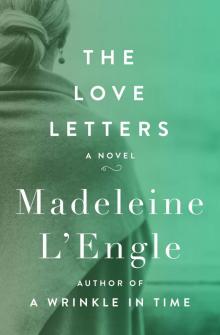 Love Letters
Love Letters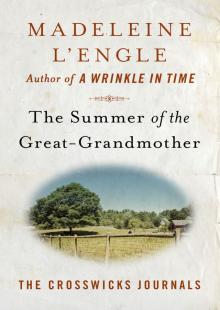 The Summer of the Great-Grandmother
The Summer of the Great-Grandmother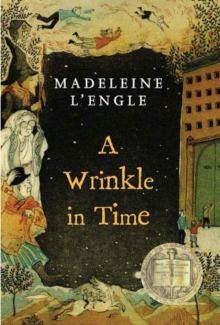 A Wrinkle in Time
A Wrinkle in Time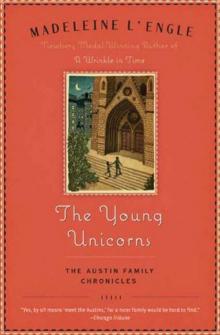 The Young Unicorns
The Young Unicorns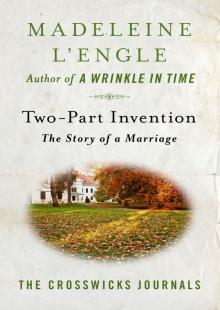 Two-Part Invention: The Story of a Marriage
Two-Part Invention: The Story of a Marriage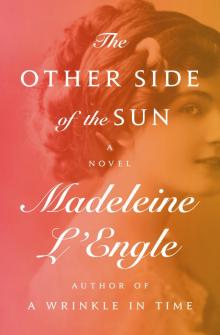 The Other Side of the Sun
The Other Side of the Sun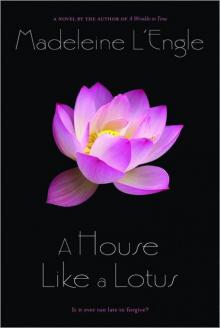 A House Like a Lotus
A House Like a Lotus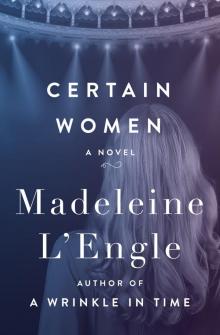 Certain Women
Certain Women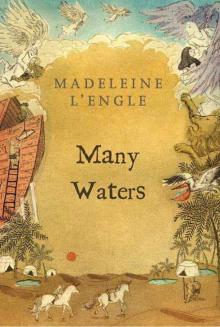 Many Waters
Many Waters Camilla
Camilla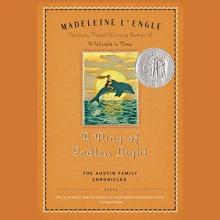 A Ring of Endless Light
A Ring of Endless Light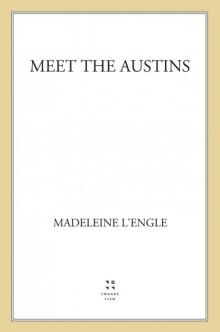 Meet the Austins
Meet the Austins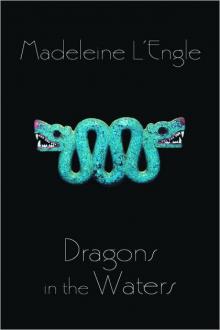 Dragons in the Waters
Dragons in the Waters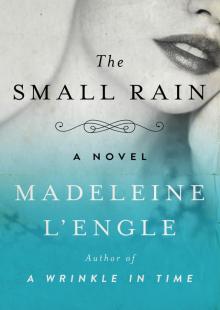 The Small Rain
The Small Rain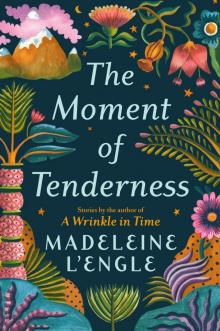 The Moment of Tenderness
The Moment of Tenderness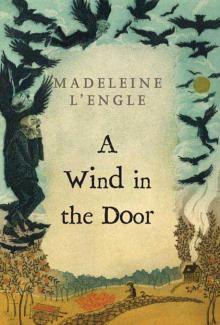 A Wind in the Door
A Wind in the Door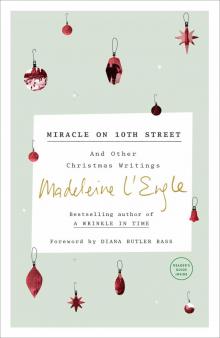 Miracle on 10th Street
Miracle on 10th Street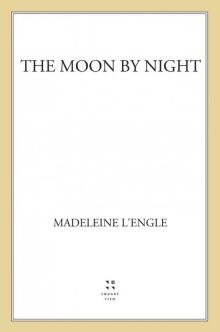 The Moon by Night
The Moon by Night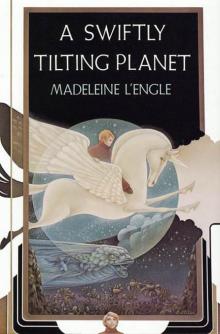 A Swiftly Tilting Planet
A Swiftly Tilting Planet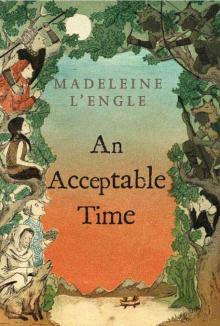 An Acceptable Time
An Acceptable Time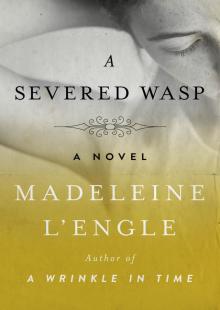 A Severed Wasp
A Severed Wasp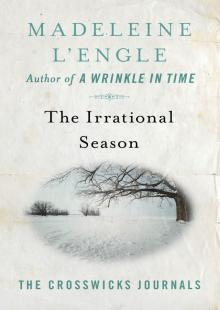 The Irrational Season
The Irrational Season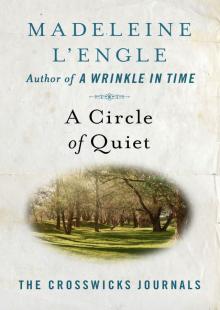 A Circle of Quiet
A Circle of Quiet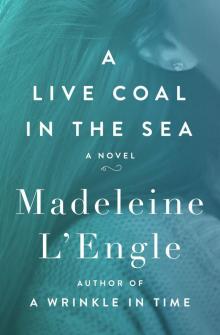 A Live Coal in the Sea
A Live Coal in the Sea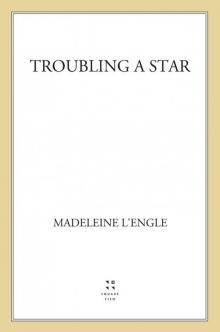 Troubling a Star
Troubling a Star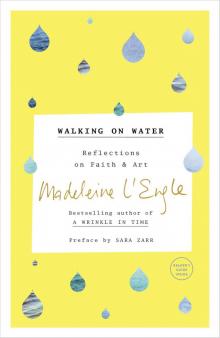 Walking on Water: Reflections on Faith and Art
Walking on Water: Reflections on Faith and Art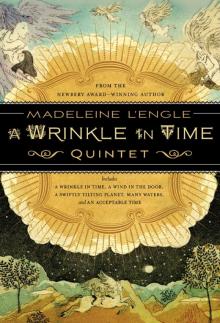 A Wrinkle in Time Quintet
A Wrinkle in Time Quintet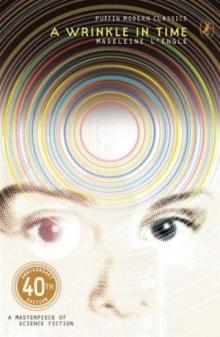 Wrinkle in Time
Wrinkle in Time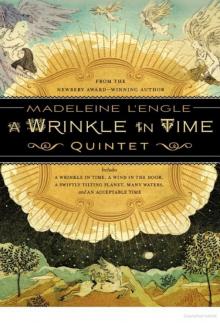 The Wrinkle in Time Quintet
The Wrinkle in Time Quintet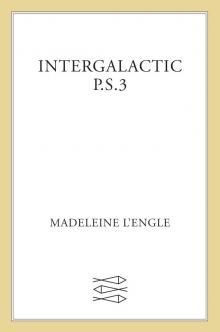 Intergalactic P.S. 3
Intergalactic P.S. 3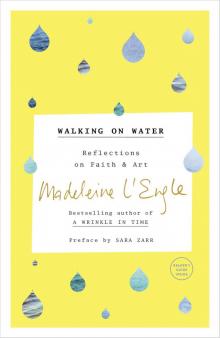 Walking on Water
Walking on Water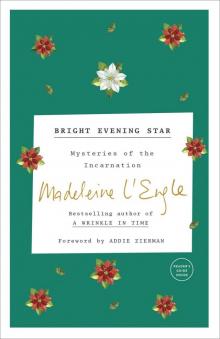 Bright Evening Star
Bright Evening Star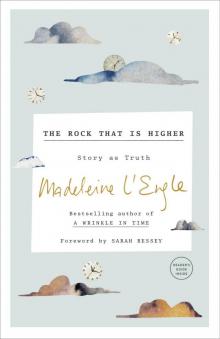 The Rock That Is Higher
The Rock That Is Higher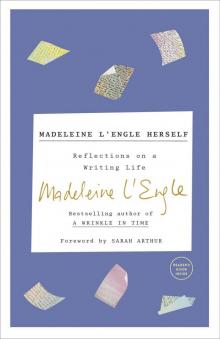 Madeleine L'Engle Herself
Madeleine L'Engle Herself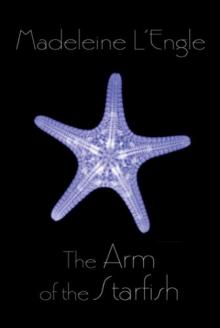 The Arm of the Starfish
The Arm of the Starfish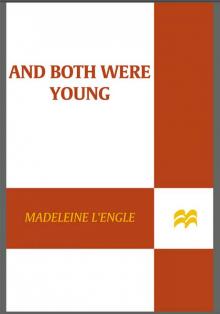 And Both Were Young
And Both Were Young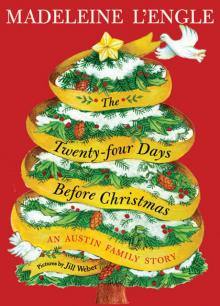 The Twenty-four Days Before Christmas
The Twenty-four Days Before Christmas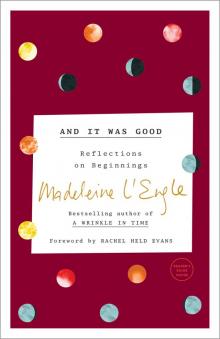 And It Was Good
And It Was Good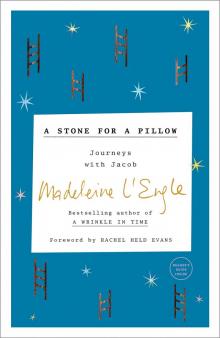 A Stone for a Pillow
A Stone for a Pillow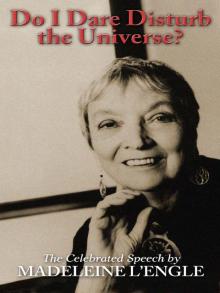 Do I Dare Disturb the Universe?
Do I Dare Disturb the Universe?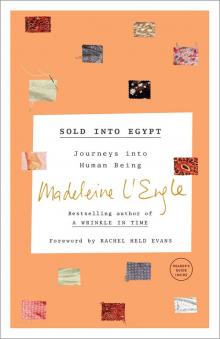 Sold into Egypt
Sold into Egypt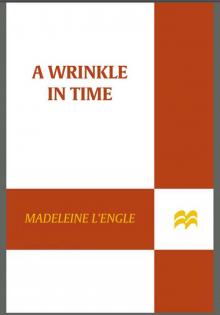 A Wrinkle in Time (Madeleine L'Engle's Time Quintet)
A Wrinkle in Time (Madeleine L'Engle's Time Quintet)